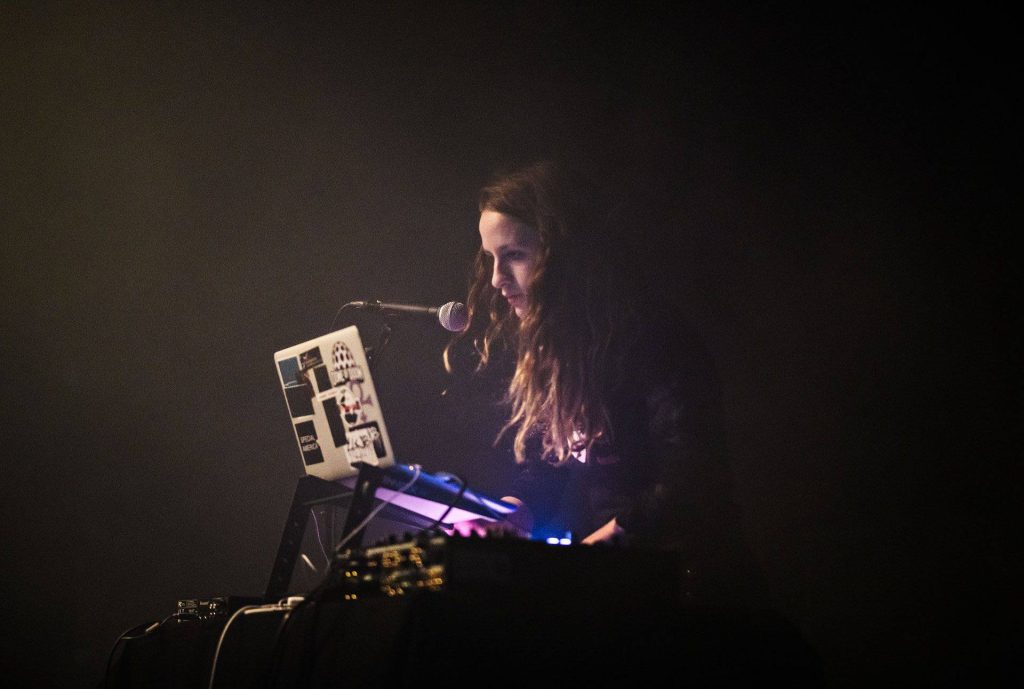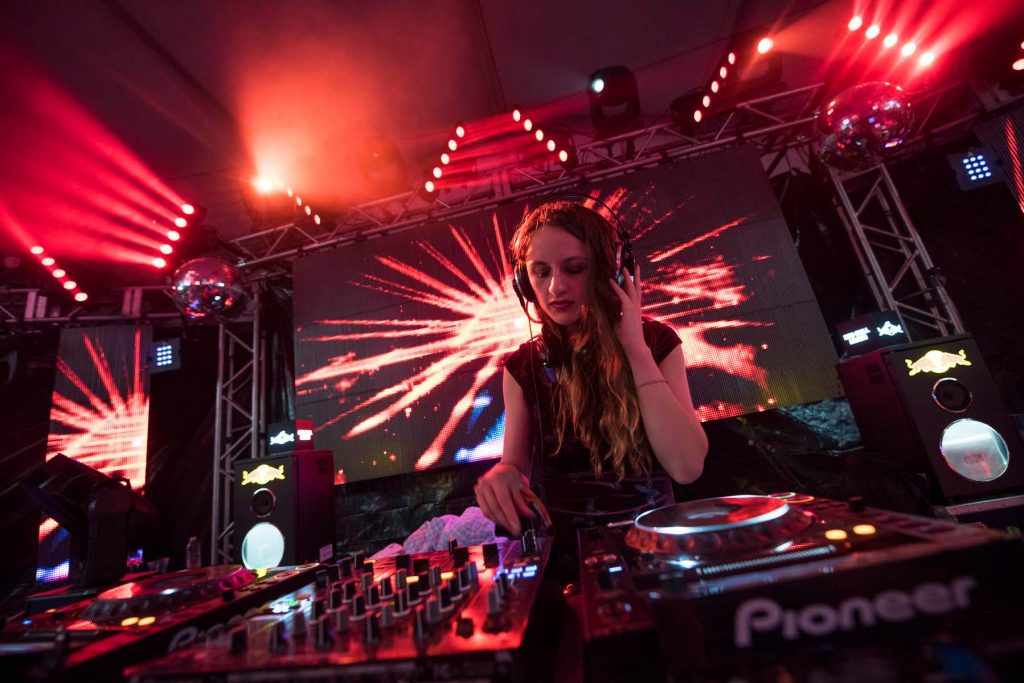
The questionnaire series “thinking about / working on” features projects and processes of students and teaching staff, asking them to share thoughts on their current topics and give insight into their practice. The questions vary slightly and can be adapted by the interviewee. The questionnaire series is edited by Karin Lingnau. If you are interested to take part feel free to contact me.
In this edition Rebecca Beauchamp (postgraduate at the KHM since 2019) talks about her Swan Meat project, latest productions, and her relations to sound in the here and now…
* What is the current focus of your work? What themes or subjects are you currently addressing in your work?
Collectively, I’m not sure if my work has a central theme. Rather, the sche- and thematics of my work change depending on what sort of project I’m working on, which, at the moment, is a new record. There are certain sonic motifs I’m drawn to obsessively, aural “tropes” I keep coming back to over & over again: big string arrangements, floaty chiptune, breakbeats, bits from classic so-called “industrial” music, et cetera. One magazine wrote about me this way after I released my 2nd EP, TAME: “Her work draws on the excess of bad-taste genres such as psytrance and the eerie worlds of early RPG video games to create a unique blend of baroque club music,” and though I’d argue that psytrance is a “bad taste” genre, or that “bad taste genres” even exist, I understand certain genres are characterized as such in the super-serious Berlin-poisoned electronic music world; these genres — psytrance, happy hardcore, gabber’s most obnoxious, musical theater, nightcore — are actually those which are my favorite. For me, they’re even tinged w/ a sense of melancholia, of shadowy nostalgia. This is to say, I guess if I was made to slap a “this is what my work is about” label on the Swan Meat project, I’d label it as such: the coming-to-terms with, or taking-to-task of, nostalgia (“hauntology,” perhaps) through sonic excess. In this way, maybe the Swan Meat project is an archival one, too.
* What defines your working process? And what is challenging your practice right now?
Honestly, my working process is pretty serendipitous; I have a perilously short attention span and I think that comes through in my work. So much of electronic music is built out of the base unit of the loop & I just can’t work with that; I itch for change after hearing the same bar repeated only a couple times. Also I hate using the word “work” to describe all this, it’s so hifalutin. But anyway, I make most everything on my laptop, in software, therefore my process is portable. I work best at night while drinking Monster NRG and instant coffee. Most challenging at the moment is this lack of… futurity that the air seems, everywhere, thick with. I’d become accustomed to building tracks around how I might perform them live– rather than the other way around– so when lockdowns hit a few months ago like a gavel I found it very difficult to — and I cringe at phrases like this, but here you go — “reimagine my workflow”. To remain in good communion with my software I have to remember, also, that a world outside of my software exists, hence the importance of presenting work live; without a live outlet, I just get lost inside the software ‘cuz it’s the only thing that’s there. I can’t “work” with that.

* What kind of materials are important to you right now and how is this expressed in your work? Is there a materiality which you find essential for your work?
Well, everything I work with is sonic raw material: the saw waves which become basses w/ a vocal affect, samples to be pulverized or chopped up, their bones splayed everywhere in MIDI. Without the fibers & germs of sound, I wouldn’t be producing. One could wax poetic forever about this. In my writing, I actually kinda do. I’m no mathematician, but I like to “read” the Fourier transform as a kind of prayer, one which tells us a sound as we understand it can be decomposed, broken down into its myriad constituents. The Fourier transform means: nothing can be broken down into more nothing. A chord is a bouquet of (mere) pitches. So, it’s not materiality but its inverse that I’m working with: how do I make nothing beautiful, listenable.
* What are you thinking about today/this month/year?
Today: I feel really gross & depleted. I’m trying to finish up this kind of drum and bass infused track I’m working on; I write music linearly, that is, I work from beginning to end, intro to close, so I’m trying to figure out what I want the next section to sound like, but I’m drawing blanks.
This month: Mostly post-Covid survival, it’s hard to make good music when this, like, eschatological gong is bang bang banging in the back of your head.
This year: If we’re talking this year as July 2019 to July 2020, I was mostly thinking about staying sane through a whirlwind of touring and wrapping up my third EP, FLESHWORLD. I was challenging myself to work as hard — ugh that word again, work — and often as possible, pushing myself to be the best producer I could possibly be, like a Pokemon trainer. 2019-2020 was really the year I started feeling like: If I’m not in pain doing this, I’m probably not doing it right. Right now I’m trying to recapture this sort of histrionic urgency.

* What would you like to find out? Do you feel the urge to explore and what are you exploring right now?
“Finding out” implies reaching a sense of certainty somewhere, and I’m not sure if that’s what I want out of anything. Mostly, I’m interested in learning things: how to speak German fluently, how to get better at the violin and/or how to conquer my fear of bringing it out of its case again after weeks of gathering dust, how to program in SuperCollider, what have you. Exploration is very important to me, especially as a producer. None of my tracks, or at least none of the tracks I really like, have begun with me laying out the idea I actually have in mind, they all stem from messing around in Ableton and creating weird effects chains and randomizing them or recording them to resampling and finding a sick sound that becomes the fundamental grain of something bigger.
* What characterizes a moment of hope for you and how does it express itself?
Oh gosh, this is a tough question. It’s hard to describe — I’ve written songs about it, though — but for me, the closest thing to ‘hope’ is that feeling one gets when one’s been drained of absolutely everything, been through the ringer, emptied, et cetera and therefore can begin again. Maybe this comes from being raised Catholic, ish. It’s why I’ve always found the end of Evangelion to actually be a hopeful coda. There are musical keys which evoke it better than anything else, and no, I don’t mean hamfisted D Major. B Major, for example; E Minor. The great thing about E Minor, right, is that it implies a parallel with C Major: resolution has not yet been achieved, but a future is beckoning on the horizon. Corny, but it’s truisms that seem the most accurate, here.
* Do you have a question for your peers or one you would like to ask in general?
I would certainly like to ask my peers what “hope” also means to them, as I struggled to convey how I felt when discussing it.
…thank you, Rebecca, for your time and insight into your working process.